The OLC Group is promoting effective initiatives to respect human rights in line with the Guiding Principles on Business and Human Rights (the “Guiding Principles”) endorsed by the UN Human Rights Council in 2011.
We are currently engaging in discussions regarding the implementation of human rights due diligence, drawing on existing initiatives.
The OLC Group has established the OLC Group Basic Policy on Harassment by Customers to ensure that the human rights of people engaged in our business are respected as well as to maximize customer satisfaction.
We discussed and revised our Human Rights Policy Statement by using the following process.

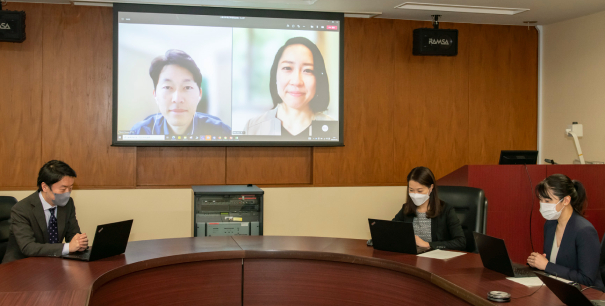
We held a dialogue meeting with experts to gain input on the draft of the revised Human Rights Policy Statement and our future human rights due diligence efforts.
Expert: Akiko Sato, Deputy Secretary General / Attorney at Law, Certified Non-profit Organization Human Rights Now
Facilitator: Takeshi Nozawa, CEO, EcoNetworks Co.
Main opinions:
・As the OLC Group’s business has a significant impact on society, its approach to respecting human rights is also expected to be highly influential in a positive way.
・The purpose of the Human Rights Policy Statement is to enable management to demonstrate its commitment to incorporating a human rights perspective as a fundamental pillar of the business.
・Given the vulnerability of employees to potential human rights violations, corporations should absolutely give priority to respecting the human rights of their employees.
・Human rights due diligence should be implemented to identify human rights risks faced by rights-holders. The failure to identify any risks can itself be considered a risk.
・No matter how much human rights due diligence is pursued, human rights risks will always remain. The purpose of human rights due diligence is to proactively identify these risks at an early stage and prevent the occurrence of serious consequences.
・There is no need to start human rights due diligence from scratch. Instead, it is important to consider how existing initiatives can be built upon and leveraged.
Based on the OLC Group Human Rights Policy Statement, the OLC Group implements initiatives to respect the human rights of everyone involved in our business, as part of the “diversity, equity & inclusion” category of our ESG materiality areas. The Sustainability Promotion Committee chaired by the Representative Director, Chief Operating Officer and President discusses the order of priority and resource allocation pertaining to initiatives related to the ESG materiality area of diversity, equity & inclusion. The results are then reported to the Executive Committee and Board of Directors for deliberation.
We reviewed our internal system for promoting human rights measures, and shifted to a system in which the Compliance Committee discusses and reports on related initiatives from FY2025.
For each ESG materiality, we have set KPIs for 2030 and KPIs for 2027 to assess our progress. The progress status is reported to the Board of Directors and Executive Committee at least once a year.

The OLC Group has established the direction of its initiatives as follows in view of the risks and opportunities related to respect for human rights.
[Risks]
・Declined guest experience value due to insufficient customer diversity measures
・Emergence of risk due to insufficient response to human rights protection
[Opportunity]
・Increasing guest experience value by adapting to changes in society and customer needs
To address changes in society and customer needs and respect diverse values in our business activities, we will implement structured measures to ensure that human rights are respected, review existing products and services, and build frameworks to give due consideration to diversity.
In conjunction with revising its human rights policy, the OLC Group has identified key human rights issues based on the following steps.
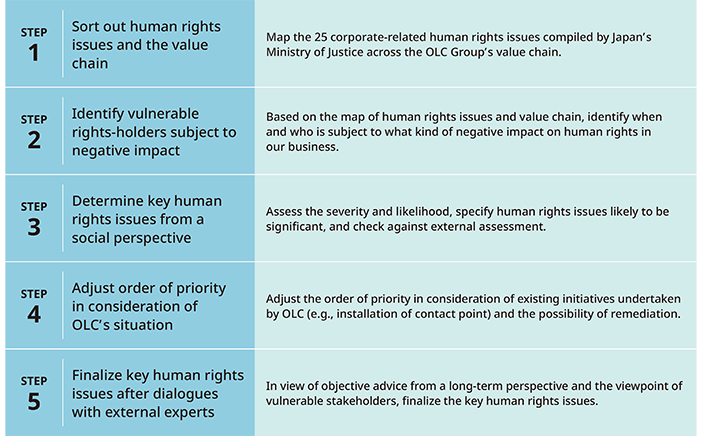
・Human rights issues in supply chains
・Human rights issues related to the environment and climate change
・Harassment
・Occupational health and safety
・Disparities in living wages and working conditions
・Discrimination (direct/indirect)
・Freedom of expression
・Gender (including LGBT)
・Human rights issues related to technology/AI
・Children’s rights
・Rights to access remedies

Based on the UN Guiding Principles on Business and Human Rights, the OLC Group implements human rights due diligence by performing the following steps: 1. Identify, analyze, and assess negative impact on human rights; 2. Prevent/mitigate the negative impact on human rights; 3. Conduct follow-up assessment on the effectiveness of the measures taken; 4. Externally disclose information.
Through this process, we are committed to engaging with stakeholders and promote remediation.
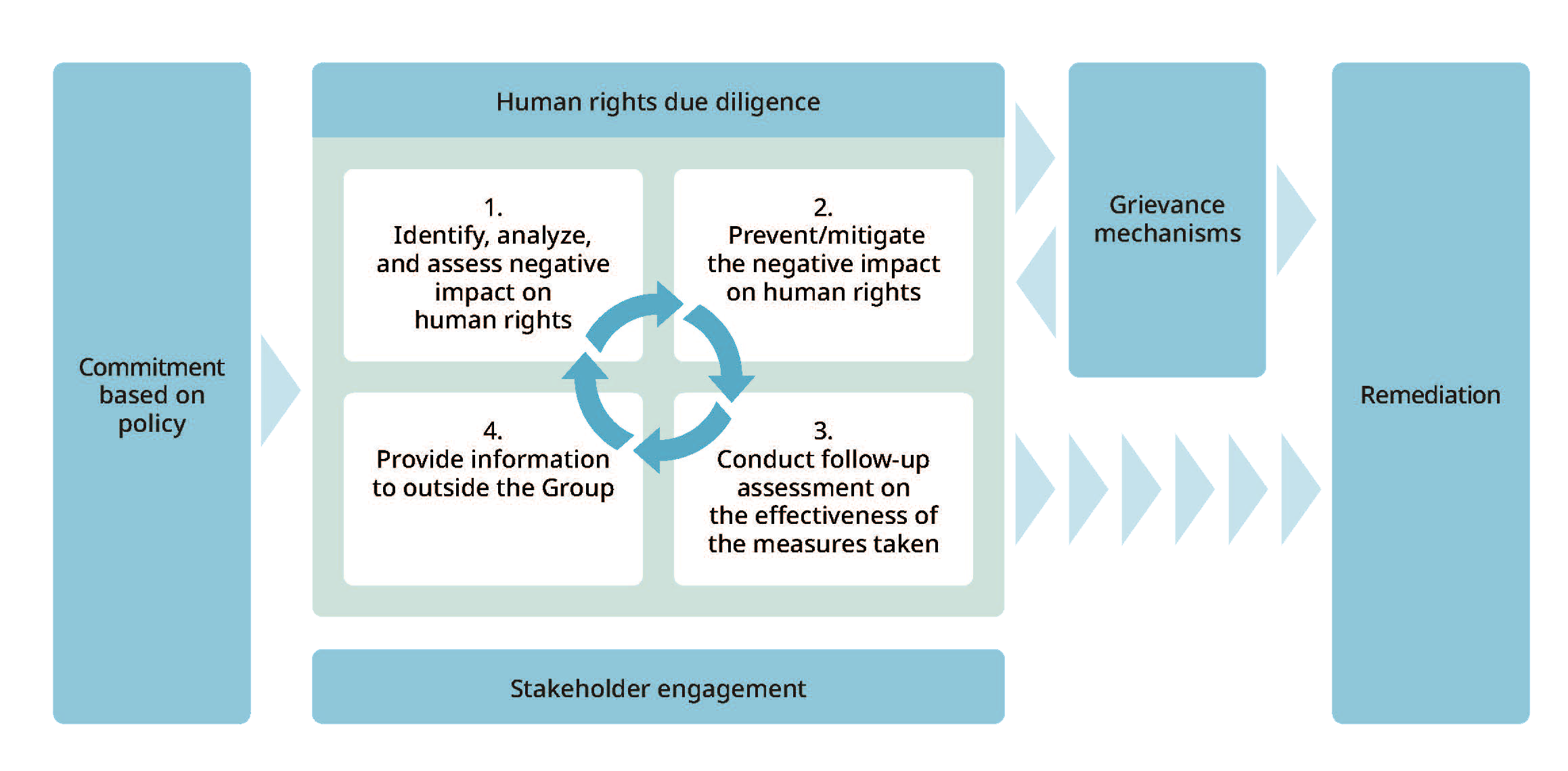
In order to “1. Identify, analyze, and assess negative impact on human rights,” we categorized the key human rights issues into three groups of employees, suppliers, and customers, and determined vulnerable stakeholders in each category. Based on this framework, we perform gap analyses (assessment and discussion for preventive and remedial measures). This process helps us identify areas where initiatives for vulnerable rights-holders are particularly insufficient.
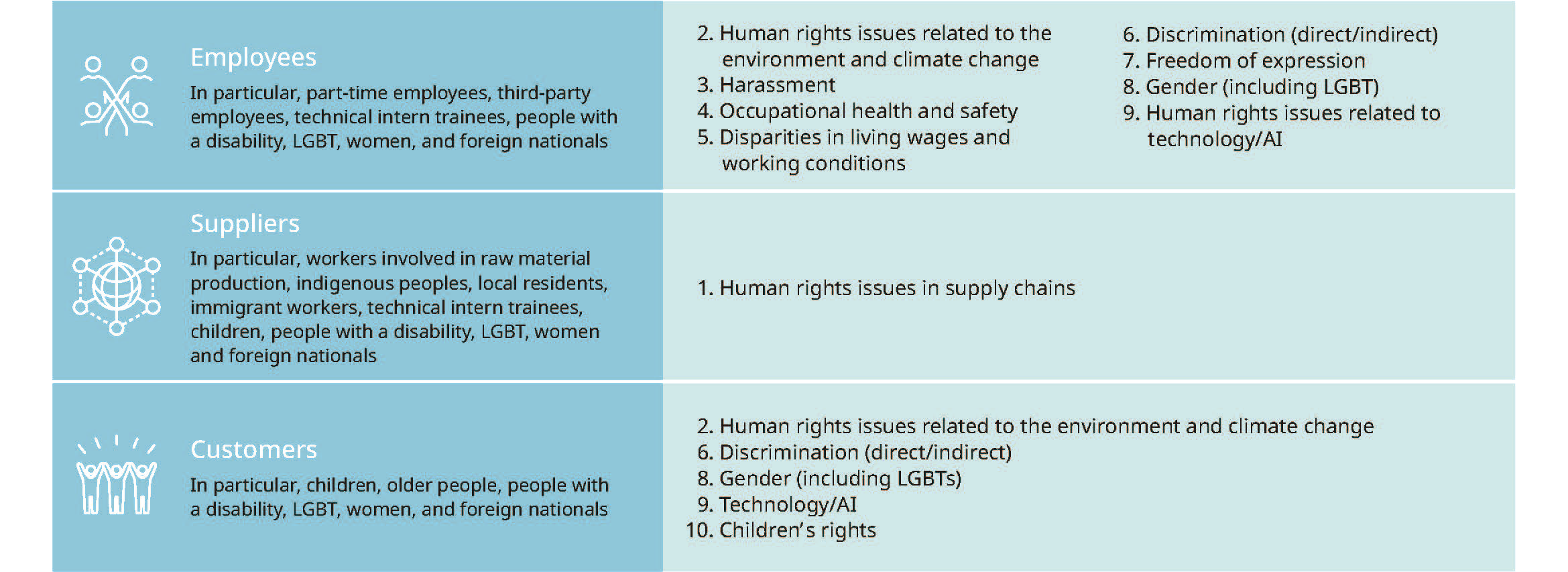
We have completed gap analyses and established a sustainable structure for promoting human rights by FY2024.
From FY2025, we have started reviewing the key human rights issues based on the results of the gap analyses, and are formulating a medium-term roadmap for the period leading up to 2030.

The key findings from the gap analysis within the three groups are outlined below.
|
Group |
Assessment and suggested preventive and remedial measures |
Issues and future actions |
|
Employees |
・In reference to the eight criteria for a grievance mechanism set forth in the UN Guiding Principles on Business and Human Rights, assessed the effectiveness of the OLC Group’s contact points (helplines) ・Investigated the number of reports received by the OLC Group’s contact points and analyzed their details |
・Make those contact points aligned with global human rights standards, including giving consideration to vulnerable rights-holders ・Enhance effectiveness of the contact points |
|
Suppliers |
The Subcommittee on Supply Chain Management identified high-risk resources and formulated a response policy ・Conducted a desktop survey on resources linked to human rights risks |
・Conduct appropriate management of internally identified high-risk resources |
|
Customers |
・Investigated potential or actual human rights issues based on reports received via contact points |
・Consider and implement response measures in view of the results of investigations of reports received via contact points |
To address the OLC Group-wide risks, we have established risk management cycles for individual risks to take prevention and response measures based on the OLC Group Risk Management Guidelines. The Risk Management Committee chaired by the Company’s President identifies, discerns, and assesses all risks concerning our business activities, categorizes them into strategic risks and operational risks, and narrows them down to those that should be addressed with priority by their respective supervisory organization.
Prevention and response measures for strategic risks including sustainability risks are formulated and implemented by organizations in charge of individual risks. The Corporate Strategy Planning Office, which oversees strategic risks, monitors their progress status, and compiles and reports the results to the Executive Committee and Board of Directors on an annual basis. The Board of Directors supervises the incorporation of countermeasures into the OLC Group’s strategy.
Risks related to human rights and diversity form part of the sustainability risks and are included in our strategic risks.
We have established a contact point for employees wishing to report any instances of improper conduct including any types of harassment and improper information management within or outside the OLC Group.
We also offer such contact points for each employment category and the OLC Group company to make it easier for employees to seek counseling for any potential issues.
Furthermore, we also provide a dedicated contact point for suppliers as a means of identifying, at an early stage, any violation or suspected violation of compliance by an executive or employee of the OLC Group with regard to their relationship with a supplier.
In order to ensure the effectiveness of this whistleblower/consulter system, internal regulations clearly specify their anonymity, and that whistleblowers and consulters shall not receive unfair treatment.
In FY2024, we received a total of 694 reports. These reports varied in nature, with 73% concerning human relations and communication, 15% about personnel systems and working conditions, 10%. involving violations of laws and rules, and the remaining 2% covering other topics.
|
FY2024 |
||
|
Number of reports received |
694 |
|
|
Details |
Human relations; communications |
73% |
|
Personnel systems; working conditions |
15% |
|
|
Violations of laws/rules |
10% |
|
|
Other |
2% |
|
To enable our employees to gain a deeper understanding of human rights and diversity, we seek to educate them by sharing information about human rights and diversity through in-house newsletters and the intranet.
In FY2024, in tandem with compliance education, we provided managerial staff and administrators with human rights education to ensure they have a basic understanding of business and human rights.
In January 2023, we also started distributing to all employees the Diversity & Inclusion Handbook, which summarizes our approach to diversity, along with model cases.
We have received feedback from across the OLC Group, such as, “I was able to gain new perspectives on the due consideration required at work,” and “I have developed a better understanding through dialogues, which introduced me to new views.”
[Structure of Diversity & Inclusion Handbook]
・How to use this D&I Handbook
・Unconscious bias
・Stereotype
・Key points
・Disabilities
・Sexual and gender minorities (SGM)
・Children
・Race, nationality, language, and culture
・Religion & beliefs
・Model cases
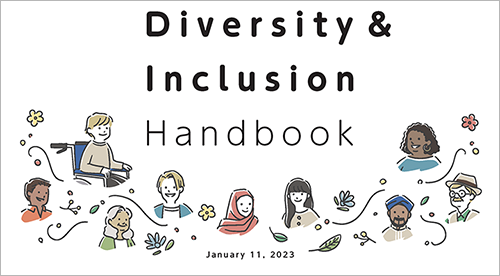
- 拡大
- Diversity & Inclusion Handbook
As a part of our actions for the KPIs for 2027 for the ESG materiality area of diversity, equity & inclusion, we issued the Diversity, Equity & Inclusion Handbook by revising the Diversity & Inclusion Handbook. We are endeavoring to provide all our employees with learning opportunities.
The Normalization Creator Class for Park operation employees helps them understand the diversity of guests and cast members as well as develop the mindset and skills needed to accept their diversity.
[Structure of Normalization Creator Class]
・Understanding the concept
・Initiatives to promote diversity at Tokyo Disney Resort
・Situation experience
・Wheelchair experience at a Park
・Discussion
・Summary
In our endeavor to understand what requirements companies are expected to meet in terms of human rights due diligence, we invited external experts to address around 20 members of the Company’s human rights-related divisions at a lecture/discussion meeting held on the topic of business and human rights. At the session, participants learned about the basics of business and human rights as well as the latest trends around the world, including Japan, and discussed human rights issues that affect corporations with reference to global examples.
External experts:
Takeshi Nozawa, CEO, EcoNetworks Co.
Yoko Doi, Co-Founder, Social Connection for Human Rights
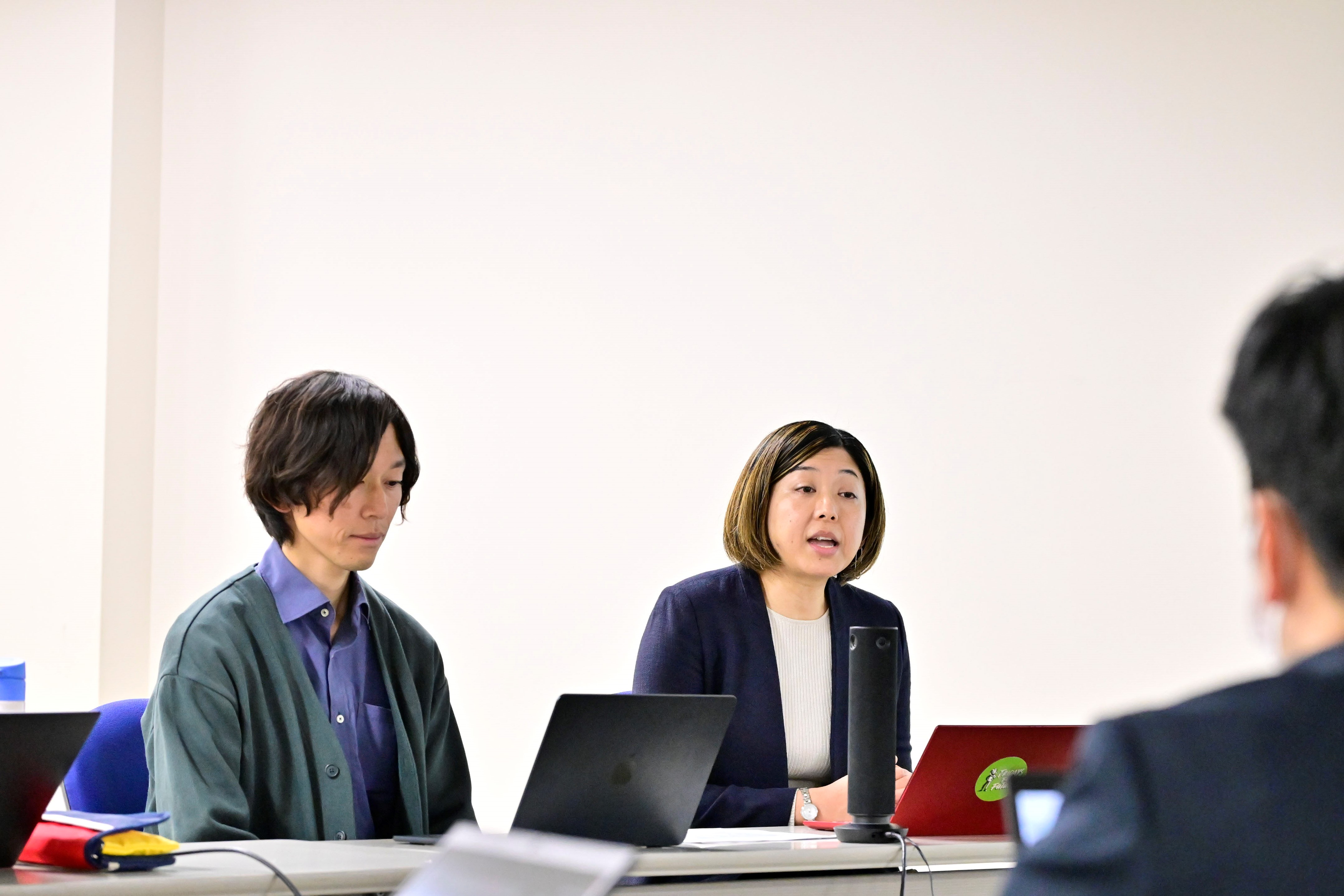
- 拡大
- At the discussion
With the aim of gaining a better understanding of children’s rights and business, an area profoundly relevant to our own activities, we hosted a lecture given by an external expert under the title, “Children’s rights and business: How to ensure children are included among company stakeholders.”
Participants acquired basic knowledge about laws and guidelines related to children’s rights worldwide, including Japan, and gained a better understanding of the impact of corporate advertising and marketing activities on children’s rights, and the behavior expected of companies. The lecture was followed by a panel discussion, which was led by the lecturer and an external expert and explored areas specific to our own business. The lecture was delivered online, with the participation of approximately 80 Group employees.
External expert:
Yumiko Horie, Head of Advocacy, Save the Children Japan
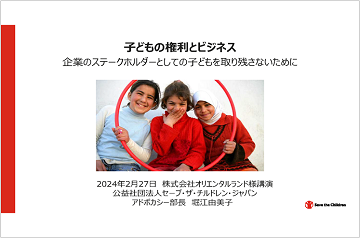
Handout for the lecture, “Children’s rights and business: How to ensure children are included among company stakeholders”
To acquire knowledge of key human rights issues and take effective measures for vulnerable stakeholders, we hosted a roundtable session with LGBT individuals. About 50 people participated in the discussion, where the LGBT guests shared the troubles they often face, in order to gain a deeper understanding of gender and sexual diversity. We also asked the guests to talk about what made them feel happy, disappointed, or dissatisfied when they were at our Theme Park or hotel, and the participants discussed potential improvements to restrooms as well as how to avoid gender-specific phrases when talking to people.
External experts
Ryo Tatsuki, Representative Director, General Incorporated Association LGBT-JAPAN
Miyu Higashine
The OLC Group has set the following indicators and goals in the ESG materiality area of diversity, equity & inclusion, which also includes respect for human rights.
|
Direction of initiatives |
KPIs |
|
|
2030 |
2027 |
|
|
[Respect for human rights] Reduce risks and ensure relief for victims through continuous efforts in human rights due diligence and awareness raising [Respect for customer diversity] Examine focus areas in light of the business environment and implement initiatives accordingly [Respect for employee diversity] Examine focus areas in light of the internal and external environment and implement initiatives accordingly |
[Respect for human rights] Enhance human rights due diligence for designated key human rights issues and expand human rights due diligence among Group companies [Respect for customer diversity] Establish a framework that promotes respect for diversity in activities [Respect for employee diversity] Establish an environment that promotes inclusion |
[Respect for human rights] ・Review key human rights issues based on gap analysis; implement corrections and remedies for vulnerable rights holders for newly identified key human rights issues; implement preventive measures ・Continue conducting human rights due diligence in fields of employees, supply chain, and customers, and initiate human rights due diligence at Group companies [Respect for customer diversity] ・Issue revised version of “Diversity & inclusion Handbook”; offer learning opportunities to all employees (100%) ・Percentage of employees who respect diversity and act accordingly: To be set by the end of FY2025 [Respect for employee diversity] |
- Completed gap analysis on key human rights issues in the fields of employees, suppliers, and customers, designated the order of priority for human rights issues based on the results, and carried out due diligence.
- Analyzed human rights issues based on the reports received via contact points, and discussed and implemented preventive measures based on the results.
- Offered seminars primarily targeting managerial staff (e.g., seminars on business and human rights, streaming video on gender and sexual diversity.)